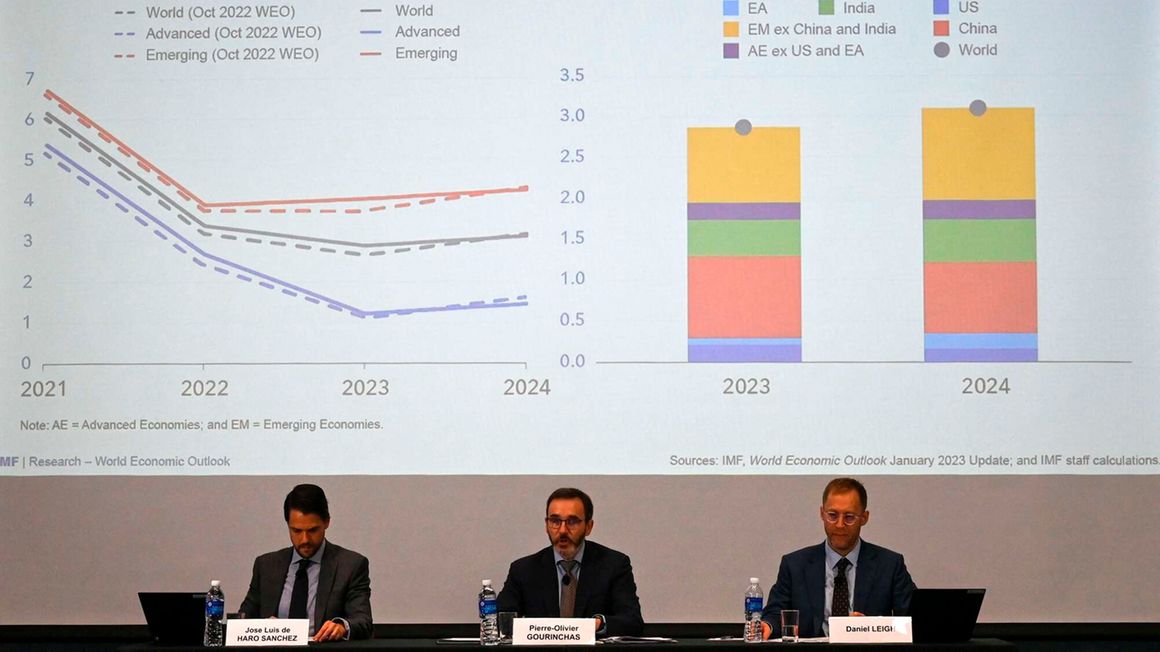BARD AI
JF-Expert Member
- Jul 24, 2018
- 3,372
- 8,108

Shirika la Fedha la Kimataifa (IMF) limesema Ukuaji wa Uchumi utaongezeka kwa 0.2% kutokana na kufunguliwa tena kwa Nchi ya #China na Utekelezaji wa Sera ya Kubana Matumizi katika Nchi nyingi duniani, jambo litakalopunguza kasi ya Mfumuko wa Bei.
Bara la Afrika litakuwa na ongezeko la Ukuaji Uchumi wa 0.1% hadi 3.8% baada ya Nchi za #SaudiArabia, #Nigeria na #AfrikaKusini kuchukua hatua za kushughulikia masuala ya Usalama, Mafuta na Madini.
Katika ripoti yake ya Oktoba 2022, #IMF ilitabiri Uchumi wa Dunia kushuka hadi 2.7% kutoka 3.2% inayotarajiwa kutokana #RussiaUkraineWar, kupanda kwa Mfumuko wa Bei na kupungua kwa shughuli za Kiuchumi Nchini China kwasababu ya #UVIKO-19.
==================
The International Monetary Fund (IMF) has revised global growth projections upwards by 0.2 percent, following China’s reopening and monetary tightening in most economies worldwide, which has slowed down inflation.
The multilateral lender said the global output (gross domestic product) growth projections will, however, remain below the historical average of 3.8 percent, recorded between 2000 and 2019, compounded by the prolonged war in Ukraine, before rebounding to 3.1 percent in 2024.
“The outlook is less gloomy than in our October forecast, and could represent a turning point, with growth bottoming out and inflation declining,” IMF’s Chief Economist Pierre-Olivier Gourinchas said at a press conference on Tuesday.
In its World Economic Outlook report released last October, IMF had forecasted the global economy to decelerate to a 2.7 percent growth rate from the 3.2 percent expected for 2022, due to the continued war in Ukraine, rising inflation and reduced economic activity in China following Covid-19 lockdowns.
Less supply chain disruptions
But with China reopening its economy to both domestic and international trade, the IMF said in the WEO (WEO) update released Tuesday that less supply chain disruptions are anticipated in 2023, production will increase and demand will rise, resulting in a higher GDP growth rate than anticipated.“The restrictions and Covid-19 outbreaks in China dampened activity last year. With the economy now re-opened, we see growth rebounding to 5.2 percent this year as activity and mobility recover,” Mr Gourinchas said.
“Our estimates suggest that for every percentage point of higher growth in China, there is a spill over effect of about 0.3 percent to the rest of the world, which is quite significant.”
The widespread wave of central bank rate hikes witnessed last year globally has also paid off, with headline inflation already showing signs of slowing down in most countries, after peaking late last year, even though food and energy prices are yet to peak in several regions.
In Africa, the growth projection has been revised upwards by 0.1 percent to 3.8 percent, mainly buoyed by “Nigeria’s rising growth in 2023 due to measures to address insecurity issues in the oil sector,” the lender said.
IMF now projects Nigeria – the continent’s largest economy by GDP – to record a 3.2 percent growth in 2023, up from the 3 percent predicted in October.
South Africa, the third largest economy on the continent, will also grow a little faster than anticipated, at 1.2 percent, but less than half the last year’s estimated growth rate, compounded by “weaker external demand, power shortages, and structural constraints”.
The projected growth rates for the region’s economies have not been revised, and are expected to remain lower in 2023, rising steadily to at least 4 percent next year.
Conflict in eastern Europe
But despite better prospects for the globe’s economy, the ongoing conflict in eastern Europe continues to pose “a threat to global stability that could destabilise energy or food markets and further fragment the global economy,” Mr Gourinchas said.The financier recommends holding of the tight monetary policies globally to keep inflation rates low, and further tightening in countries where inflation rates remain elevated.
“The inflation news is encouraging, but the battle is far from won. Monetary policy has started to bite, with a slowdown in new home construction in many countries. Easing too early risks undoing all the gains achieved so far,” Mr Gourinchas said.
THE EASTAFRICAN